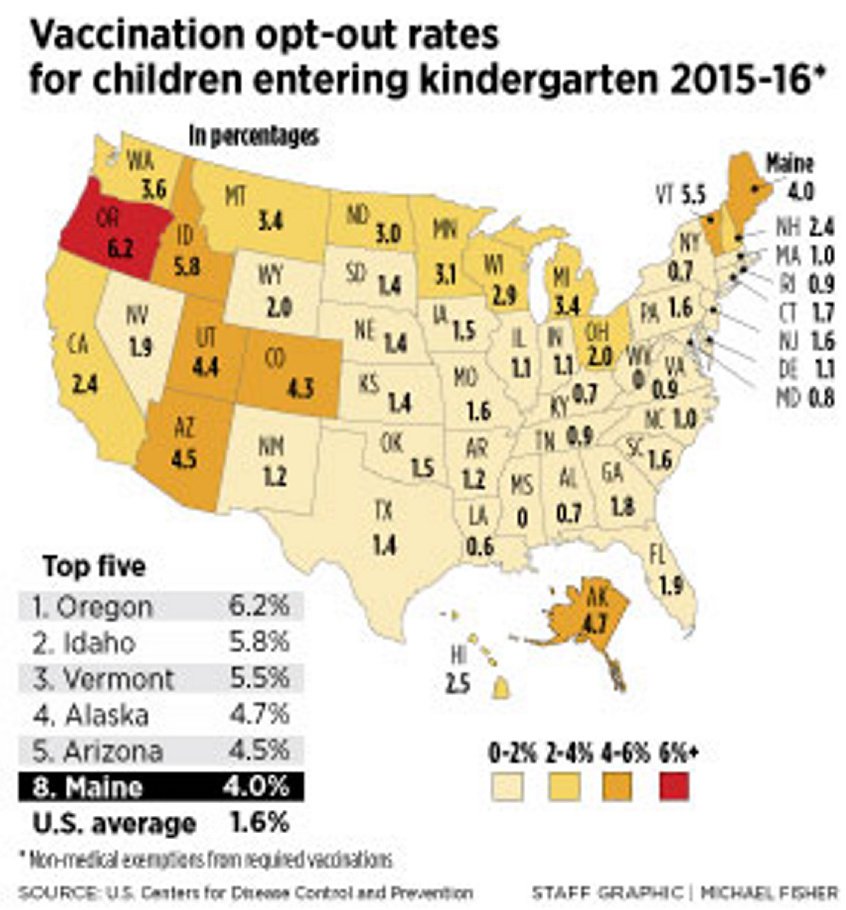Maine continues to have one of the highest rates of unvaccinated students entering kindergarten, ranking eighth in the country according to a U.S. Centers for Disease Control and Prevention report released this week.
Low immunization leaves Maine at risk for breakouts of infectious diseases such as measles, chickenpox, pertussis and rubella, public health officials say. Parents of 4 percent of kindergarteners chose not to vaccinate their children for non-medical reasons for the 2015-16 school year. That’s more than twice the national average of 1.6 percent. Oregon had the highest rates of parents foregoing vaccines for their kindergarteners at 6.2 percent, followed by Idaho, Vermont, Alaska, Arizona, Utah and Colorado.
Maine also was eighth worst in the 2014-2015 school year, but was fifth-worst for vaccine coverage in 2013-14, when kindergarten opt-outs reached 5.2 percent.
The low vaccination rates could rekindle attempts to pass a law that would make it more difficult for parents to forgo vaccinations for their children. Gordon Smith, executive vice president of the Maine Medical Association, which represents physicians before the Legislature, said bills that improve vaccination rates are a “high priority” for doctors.
“There’s no question this will be a topic of discussion for the next Legislature,” Smith said. “From a public health standpoint, we ought not have to be re-arguing the fact that immunizations are one of the most potent public health advances of the 20th and 21st centuries.”
Infectious disease rates plummeted after the introduction of vaccines, including polio, measles and mumps.
Currently, parents can sign a form opting out of vaccinations based on religious or philosophical grounds, while other states do not have philosophical exemptions or make it more difficult to opt out. Maine is among the most lenient states in how easy it is for parents to opt out of vaccines. Two states, West Virginia and Mississippi, do not permit any non-medical exemptions. Starting this fall, California joined them.
Some states, including California, Vermont and Michigan, have passed laws that made it more difficult to opt out of vaccines after a 2014-15 measles outbreak that started at Disneyland in California.
LEPAGE VETO
A 2015 bill that would have required parents to consult with and obtain the signature of a medical professional before opting out of immunizations passed the Maine House and Senate by wide margins. But it failed to become law when the House came up five votes short of overriding a veto by Gov. Paul LePage. He objected to the law, arguing that parents must maintain the freedom to choose whether to vaccinate. Other Republicans argued that the law intruded on the doctor-patient relationship.
Some parents are refusing vaccines for their children based on unfounded fears that the vaccines cause autism – a claim that has been debunked by numerous scientific studies. Public health advocates have pointed out the health benefits of having a better-vaccinated populace and the rights of immune-compromised children who are too sick to get vaccines to be protected from diseases that are more dangerous to them.
“I think it will come up again,” said Rep. Ralph Tucker, a Brunswick Democrat who helped spearhead the 2015 efforts to tighten Maine’s vaccination laws. “I want to help as much as I can.”
Tucker said the state should not wait for an outbreak or a new governor to introduce bills that would prevent the public from being harmed by infectious diseases. He doesn’t yet have a specific plan for introducing a bill.
While 4 percent opting out may not sound like a high number, the vaccination rate varies among schools – with some schools having 10 percent to 20 percent or higher opt-out rates, while other schools have close to 100 percent immunization coverage, according to the latest state data.
HI PERCENTAGE IN 40 SCHOOLS
Statistics provided by the Maine CDC show that at least 40 Maine elementary schools had 10 percent or more of their students in kindergarten or first grade unvaccinated, leaving those schools most at risk for a disease outbreak.
Kate Colby, program manager for childhood health for MaineHealth, the parent company of Maine Medical Center, said better vaccination coverage is vital to improving public health, and she wouldn’t be surprised to see another attempt in the Legislature. Colby said Maine needs other improvements, including adding more vaccines to the schedule of required immunizations. She said Maine is one of only three states that doesn’t require the TDAP vaccine, for tetanus, diphtheria and pertussis, among middle school students.
“We have the third-highest rates of pertussis in the country,” Colby said.
Colby said other vaccines that should be added to the schedule would protect the public against Hepatitis A and B, HPV and meningitis.
A 2015 study by the Pew Charitable Trusts found that states that have stricter laws for opting out of vaccines have better vaccination rates. The federal report this week on kindergarten immunizations, noted that Michigan’s kindergarten vaccination rate improved by 1.3 percent after a law was passed making it more difficult to forgo vaccines. Vermont eliminated the philosophic exemption in 2015, but it did not go into effect until 2016-17 school year, so the effectiveness of its law can’t yet be measured.
Send questions/comments to the editors.




Success. Please wait for the page to reload. If the page does not reload within 5 seconds, please refresh the page.
Enter your email and password to access comments.
Hi, to comment on stories you must . This profile is in addition to your subscription and website login.
Already have a commenting profile? .
Invalid username/password.
Please check your email to confirm and complete your registration.
Only subscribers are eligible to post comments. Please subscribe or login first for digital access. Here’s why.
Use the form below to reset your password. When you've submitted your account email, we will send an email with a reset code.